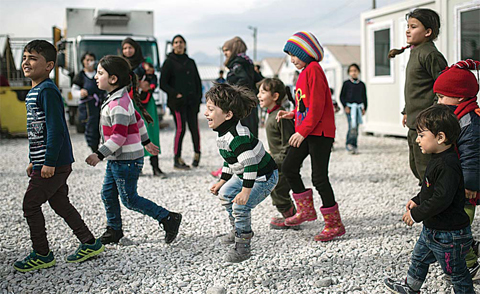 Migrant children play in a camp after crossing the Macedonian-Greek border, near Gevgelija, yesterday. Macedonia has begun building a new razor-wire fence parallel to an existing one on the Greek border to make it harder for migrants to enter illegally. —AFP
Migrant children play in a camp after crossing the Macedonian-Greek border, near Gevgelija, yesterday. Macedonia has begun building a new razor-wire fence parallel to an existing one on the Greek border to make it harder for migrants to enter illegally. —AFPVIENNA: On the eve of a European Union summit to debate Europe's migrant crisis, Austria announced Wednesday a daily limit in the number of asylum requests and eastern EU members set a mid-March deadline for a plan agreed with Turkey to bear fruit.
German Chancellor Angela Merkel, under intense pressure at home, meanwhile urged a "common stance" in the 28-nation bloc, arguing that the Turkey plan "offers a good solution".
But a separate scheme to ease pressure on the migrant buildup on the EU's rim ran into problems after a planned mini-summit with Turkey was scrapped following a bomb attack in Ankara.
The Austrian government announced it would set a daily cap of 80 claims of asylum in the country. It also said it would grant entry to a daily maximum of 3,200 people who were transiting Austria to seek asylum in a neighbouring country, effective today. The move came a day after Austria said it would step up border controls and several weeks after saying it aimed to slash the number of asylum claims this year to 37,500 from 90,000 in 2015.
Interior Minister Johanna Mikl-Leitner said Austria had no choice but to act, as there was no European solution yet in place. "Austria is among the EU countries most under strain and is reaching breaking point. It stands to reason to want to secure your own borders when there is no European solution," she said.
In such a situation, she said it was important that every country through the Balkans-the main route for migrants bound for northern Europe-follow Austria's lead.
Austrian Chancellor Werner Faymann said that nevertheless he still supported a deal proposed by Germany under which Turkey would seal its borders and then fly refugees to Europe.
Then they would be settled under a quota system. At present the vast majority of migrants enter the EU through Greece and Italy, but most are able to continue their journeys to northern Europe. However, most EU countries have shown little enthusiasm for the plan, with the so-called Visegrad Four (V4) -- Poland, the Czech Republic, Slovakia and Hungary-openly defying Merkel.
They have pledged to help Macedonia and Bulgaria close their borders with Greece, which would leave Athens with rapidly rising numbers of refugees while effectively excluding it from Europe's passport-free Schengen zone.
EU-Turkey talks cancelled
Speaking in Berlin earlier Wednesday, Merkel said "we will speak at the upcoming EU Council about how we can work together to protect our external border, and I want us to work together on the EU-Turkish agenda that 28 members have decided".
Ahead of Thursday's full gathering of the EU's 28 members in Brussels, Merkel and Faymann had been due to host talks with nine other EU leaders and Turkish Prime Minister Ahmet Davutoglu. The meeting was to flesh out an idea for easing pressure on the migrant buildup by focussing on ways in which the 11 countries-dubbed a "coalition of the willing" by the German media-would resettle Syrian refugees who had fled to Turkey.
But Davutoglu cancelled his trip following a bomb attack in Ankara on Wednesday that left more than two dozen dead, European diplomats and Council head Donald Tusk said.
Slovenian soldiers
Following Austria's announcement, the Slovenian government said Wednesday it had asked parliament to authorise the deployment of soldiers to its frontiers to help control the migrant flow.
Last October, lawmakers in the country already approved legislation allowing the army to provide technical and logistic support.
The centrist government of Prime Minister Miro Cerar now wants soldiers to be granted the same powers as police officers and help patrol its southern frontier with Croatia as of Monday.
Overnight Croatia sent 217 Afghan, Syrian and Iraqi refugees back to Serbia for reasons that were not immediately clear, the UN refugee agency's spokeswoman said Wednesday. "They were returned by train late (Tuesday), pretty much starved and frightened, and most of them spent (the) night on a platform of railway station in Sid," a western Serbian town bordering Croatia, Mirjana Milenkovski told AFP.
They were given the option of seeking asylum in Serbia or being sent back to their country of origin, she said, adding that otherwise they risked being treated as illegal migrants. - AFP









